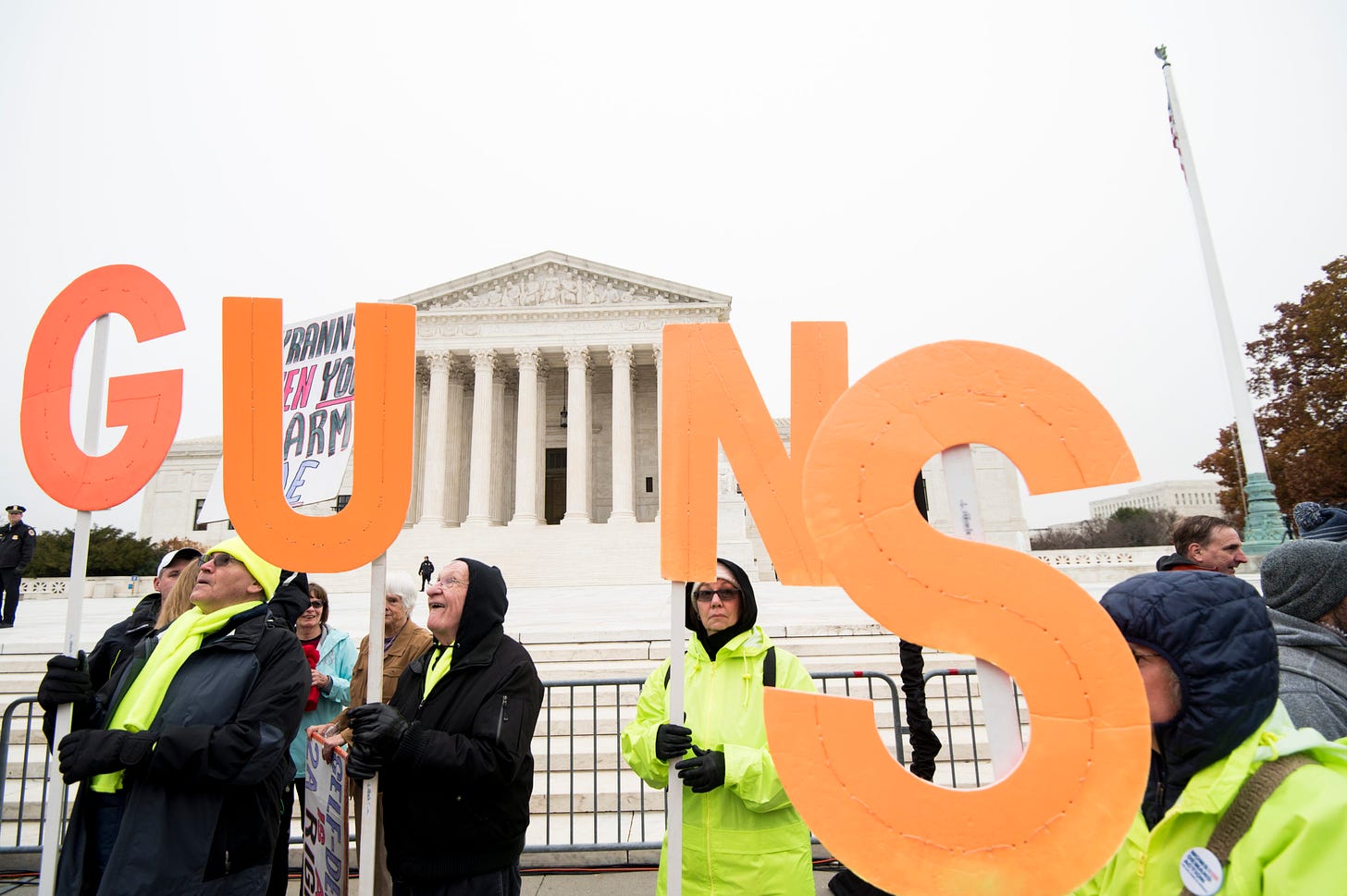
In Striking Down Century-Old Law, Supreme Court Gives Another Boost to Gun Culture
Conservative majority overturns N.Y. measure that limited concealed carry to people with a special need for self-protection.

In a 6-3 decision yesterday, the Supreme Court in NY Rifle & Pistol Association vs. Bruen tells us again that guns are king. Not to worry that there were 246 mass shootings in America this year through early June, including 13 in one weekend this month.
It’s true that the new decision is not strictly about semiautomatic rifles of the kind used to kill 19 schoolchildren in Uvalde and 10 grocery shoppers in Buffalo. Rather, the case involved a New York state law requiring owners to show a “special need” to obtain a license to carry a concealed weapon. That requirement prohibited ordinary folk from walking about town with loaded weapons hidden in their pockets, although it permitted off-duty police to do so. Yesterday’s ruling deemed New York’s law, and presumably also the similar measures on the books in five other states (California, Hawaii, Maryland, Massachusetts, and New Jersey), unconstitutional.
Safe streets, America? Sorry, we’re all originalists here. As Justice Clarence Thomas’s majority opinion puts it, after rehearsing various eighteenth- and nineteenth-century restrictions on publicly carrying firearms, “None of these historical limitations on the right to bear arms . . . operated to prevent law-abiding citizens with ordinary self-defense needs from carrying arms in public for that purpose.”
Never mind that no one’s yet invented a thresher to separate the “Good Guy” wheat from the “Bad Guy with Gun” chaff.
And never mind that the New York law overturned with this decision had been on the books for more than a century. Overturning it seems less an act of fidelity to the original meaning of the Constitution and Bill of Rights than bending Second Amendment jurisprudence to fit right-wing ideology.
Yesterday’s decision sends yet another signal of approval for an armed society and raises new hurdles for lawmakers who wish to do something about the problem.
Don’t blame us, Thomas’s majority opinion suggests. It’s the Constitution, stupid! “When the Second Amendment’s plain text covers an individual’s conduct, the Constitution presumptively protects that conduct.”
But what about the “the plain text” of the first four words of the Second Amendment—“a well regulated Militia”?
Ah, writes concurring Justice Samuel Alito, we took care of that little problem back in 2008: “We decided [in District of Columbia v. Heller] that ‘the people,’ not just members of the ‘militia,’ have the right to use a firearm to defend themselves.”
In Heller, a 5-4 conservative majority invalidated a Washington, D.C. ordinance that banned handguns kept in homes. Justice Anton Scalia’s opinion held that the Second Amendment protects the individual right to possess weapons for lawful purposes, such as to defend oneself at home. Dissenting Justice John Paul Stevens saw the big picture and later wrote in the Atlantic that “all could foresee the negative consequences of the decision,” which he called “a radical change in the law.”
As Justice Stevens predicted, it’s damn hard to close the floodgates once you’ve opened them. With its New York Rifle decision, the majority brazenly extends Heller beyond homes and beyond recognition: “Because many people face a serious risk of lethal violence when they venture outside their homes,” Alito’s concurring opinion pronounces, “the Second Amendment was understood at the time of adoption to apply under those circumstances.”
In his concurring opinion, Justice Brett Kavanaugh repeats a point made in Heller: that “the right secured by the Second Amendment is not unlimited.” Sure, laws forbidding guns to felons or the mentally ill and laws forbidding guns in “sensitive places such as schools and government buildings” are not necessarily unconstitutional. Here’s the reality, though: The deluge of firearms on our streets—120 guns for every 100 persons, per a 2018 analysis—makes concealable weapons available to just about anyone, including domestic abusers and ex-felons who aren’t supposed to have them, and means that firearms, including AR-15s, inevitably get into “sensitive places.”
Once upon a time, jurists opened their eyes to the social effects of their decisions. As Justice Oliver Wendell Holmes’ pronounced long ago, “The life of the law . . . is experience.” It is in that tradition that Justice Stephen Breyer writes in dissent: “I cannot agree . . . to strike New York’s law down . . . without [the majority] considering the potentially deadly consequences of its decision.”
Alito’s answer? “The New York law at issue in this case obviously did not stop that [Buffalo] perpetrator.” Think about that for a minute. Alito is implying that because the law can’t stop all bad guys with guns, there’s little use in trying to make it harder for any bad guys to get guns.
We’re in trouble, folks. The only glimmer of hope is that the decision came down on the same day that the Senate passed, by a 65-33 bipartisan vote, the first national gun safety legislation in almost 30 years.
But it’s hard to sugarcoat a reactionary Court tossing out a century-old law and eviscerating a state legislature’s power, which the majority loves to love when a red-state legislature’s voter suppression measure is before them. Yet in New York’s case, blue-state representatives’ power to protect innocent lives means nothing for justices who are true believers in an entitlement to carry concealed guns and AR-15-style rifles in the public square.
The hypocrisy is mind-boggling—and likely, as Justice Breyer observes, deadly.




